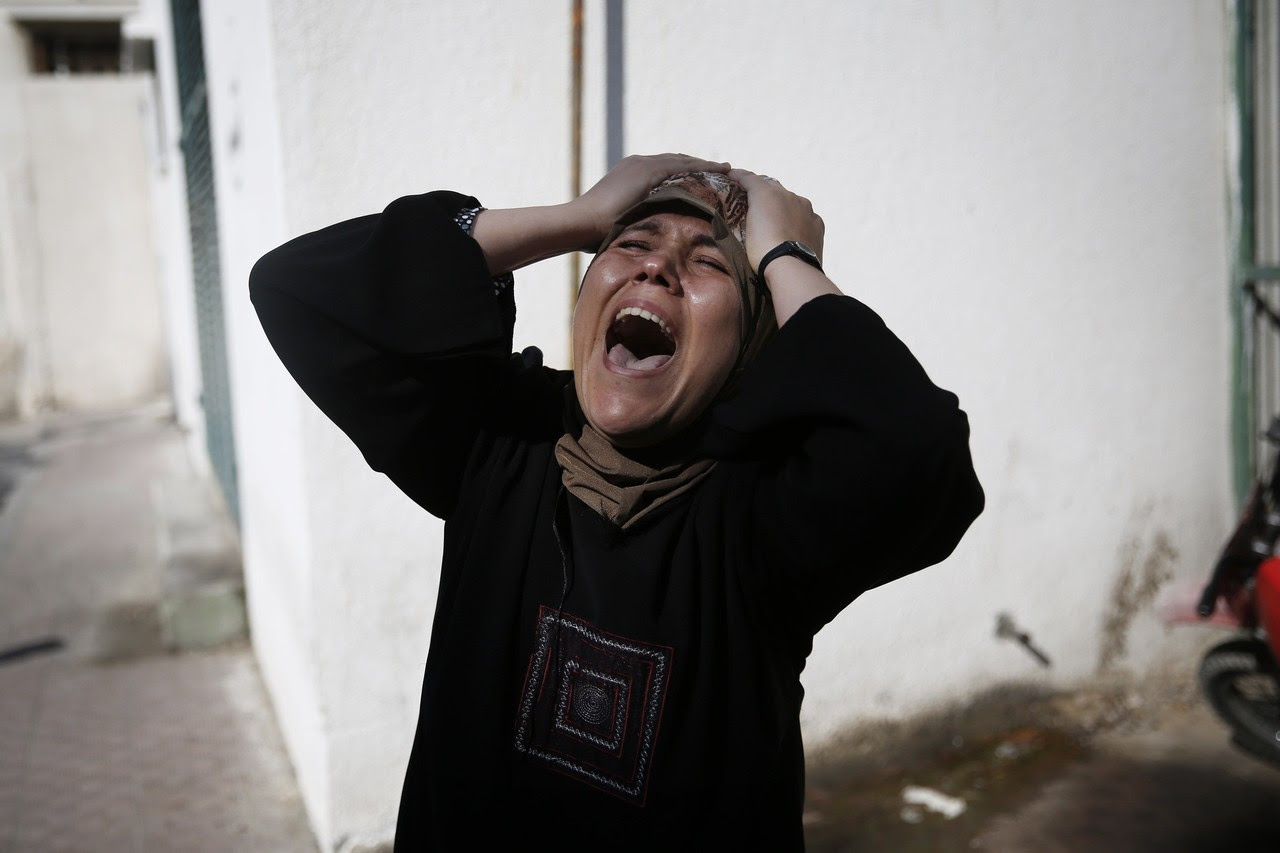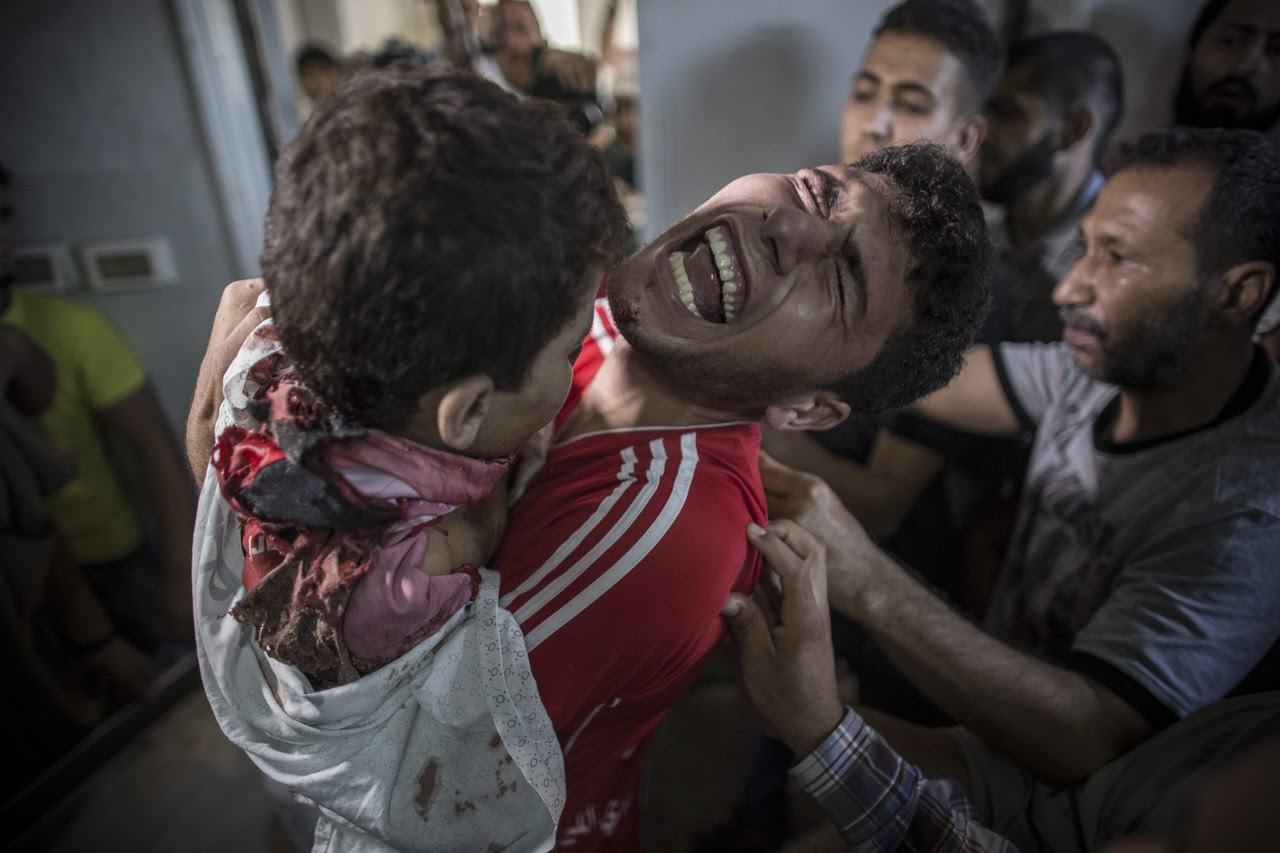
The mother of one of the four Palestinian children from the Bakr family who were killed by Israeli military strikes on Wednesday grieves outside a morgue in Gaza City. Eight boys from the Bakr family had gone to the beach because their Gaza neighborhood had become a constant target of Israeli airstrikes: photo by Finbarr O'Reilly / Reuters. 16 July 2014
The first projectile hit the sea wall of Gaza City’s little harbour a little after four o’clock. As the smoke from the explosion thinned, four figures could be seen running, ragged silhouettes, legs pumping furiously along the wall. Even from a distance of 200 metres, it was obvious that three of them were children.
Jumping off the harbour wall, they turned on to the beach, attempting to cross the short distance to the safety of the Al-Deira hotel, base for many of the journalists covering the Gaza conflict.
They waved and shouted at the watching journalists as they passed a little collection of brightly coloured beach tents, used by bathers in peacetime.
It was there that the second shell hit the beach, those firing apparently adjusting their fire to target the fleeing survivors.
As it exploded, journalists standing by the terrace wall shouted: “They are only children.” In the space of 40 seconds, four boys who had been playing hide and seek among the fishermen’s shacks built on the wall were dead.
-- Peter Beaumont in Gaza City, The Guardian, 16 July 2014
There is no stray bullet, sirs.
No bullet like a worried cat
crouching under a bush,
no half-hairless puppy bullet
dodging midnight streets.
The bullet could not be a pecan
plunking the tin roof,
not hardly, no fluff of pollen
on October's breath,
no humble pebble at our feet.
plunking the tin roof,
not hardly, no fluff of pollen
on October's breath,
no humble pebble at our feet.
So don't gentle it, please.
We live among stray thoughts,
tasks abandoned midstream.
Our fickle hearts are fat
with stray devotions, we feel at home
among bits and pieces,
all the wandering ways of words.
tasks abandoned midstream.
Our fickle hearts are fat
with stray devotions, we feel at home
among bits and pieces,
all the wandering ways of words.
But this bullet had no innocence, did not
wish anyone well, you can't tell us otherwise
by naming it mildly, this bullet was never the friend
of life, should not be granted immunity
by soft saying -- friendly fire, straying death-eye,
why have we given the wrong weight to what we do?
wish anyone well, you can't tell us otherwise
by naming it mildly, this bullet was never the friend
of life, should not be granted immunity
by soft saying -- friendly fire, straying death-eye,
why have we given the wrong weight to what we do?
Mohammed, Mohammed, deserves the truth.
This bullet had no secret happy hopes,
it was not singing to itself with eyes closed
under the bridge.
This bullet had no secret happy hopes,
it was not singing to itself with eyes closed
under the bridge.
Naomi Shihab Nye: For Mohammed Zeid of Gaza, Age 15, from Tender Spot: Selected Poems, Bloodaxe, 2008

The body of one of four children from the Bakr family who were
killed by Israeli forces while playing on a Gaza City beach is carried
during the children’s funeral: photo by Mohammed Asad /APA Images, 16 July 2014

A man wailed as he held the body of his young brother shortly after he was killed. Faris Bakr, an informal spokesman for the Bakr family, said the four victims of Israel's missiles weren't its first. Three family members were killed during the Israeli incursion into Gaza during the winter of 2008-2009, he said: photo by Oliver Weiken/European Pressphoto Agency, 16 July 2014

A Palestinian inspects the damage after the Israeli missiles struck. The boys were playing near this tin hut above the harbor, pretending it was a jail, according to 11-year-old Araby Bakr, who survived the shelling: photo by Ali Jadallah / APA Images / Zuma Press, 16 July 2014



5 comments:
Naomi Shihab Nye reads For Mohammed Zeid of Gaza, Age 15
Tom,
Naomi Shihab's Nye's question is one for all of us, not least journalists and politicians, to ask ourselves each day: "Why have we given the wrong weight to the things we do?" Thanks for another beautiful and disturbing post. It roils on.
-David
A friend posted this film footage of Palestine in 1896, people of all faiths living side by side:
http://hummusforthought.com/2014/02/11/what-did-palestine-look-like-in-1896/
If then, why not now?
God, Tom, I wish your blog for today, pictures and all, exactly as you posted it, was the front page of the new york times. My heart is broken.
Many thanks to all who now attend in sorrow to the ongoing tragedy.
David,
Naomi's question has been open in my mind all night long, still awaiting an answer.
Maureen,
The images of a knowable and peaceable community with Arabs and Jews living side by side are haunting to see and reflect upon now.
(In case you missed it, such images appear at the beginning of Ronen Berelovich's remarkable documentary, linked to here a few posts ago...)
And if not now... when?
Amy,
There is a growing mountain of broken hearts round the world, now, and about the only consolation in this is that at least it shows -- as does Naomi's poem -- that we do still have hearts... fragile as they and we may be.
__
Peter Beaumont of the Guardian, who has been in the middle of the rubble and the horror and the fear in Gaza for twelve long nights and days now, and reporting on events with as much courage and balance and objectivity as it's possible for a witness to summon, today files this overview. Worth the time... and tears.
Post a Comment